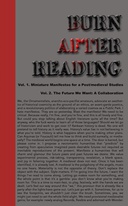Explore

Burn After Reading
Eileen A. Joy (ed., author), Myra Seaman (editor), Jeffrey Jerome Cohen (editor), Heather Bamford, Frank Battaglia, Bettina Bildhauer, Martha Easton, Maggie Williams, Ruth Evans, Joshua R. Eyler, Lara Farina, Matthew Gabriele, Gaelan Gilbert, Noah D. Guynn, David Hadbawnik, Guy Halsall, Cary Howie, Shayne Aaron Legassie, Erin Maglaque, Material Collective, Thomas Mical, Chris Piuma, Daniel C. Remein, Christopher Roman, Eva von Contzen, Erik Wade, Lisa Weston, Anne Harris, Karen Eileen Overbey, L.O. Aranye Fradenburg, J. Allan Mitchell, Will Stockton, Lowell Duckert, Steve Mentz, Jonathan Hsy, Julie Orlemanski, Julian Yates
2014
0 Ungluers have
Faved this Work
Login to Fave
The essays, manifestos, rants, screeds, pleas, soliloquies, telegrams, broadsides, eulogies, songs, harangues, confessions, laments, and acts of poetic terrorism in these two volumes — which collectively form an academic “rave” — were culled, with some later additions, from roundtable sessions at the International Congress on Medieval Studies in 2012 and 2013, organized by postmedieval: a journal for medieval cultural studies and the BABEL Working Group (“Burn After Reading: Miniature Manifestos for a Post/medieval Studies,” “Fuck This: On Letting Go,” and “Fuck Me: On Never Letting Go”) and George Washington University’s Medieval and Early Modern Studies Institute (“The Future We Want: A Collaboration”), respectively. Gathering together a rowdy multiplicity of voices from within medieval and early modern studies, these two volumes seek to extend and intensify a conversation about how to shape premodern studies, and also the humanities, in the years ahead. Authors in both volumes, in various ways, lay claim to the act(s) of manifesting, and also anti-manifesting, as a collective endeavor that works on behalf of the future without laying any belligerent claims upon it, where we might craft new spaces for the University-at-large, which is also a University that wanders, that is never just somewhere, dwelling in the partitive — of a particular place — but rather, seeks to be everywhere, always on the move, pandemic, uncontainable, and always to-come, while also being present/between us (manifest). This is not a book, but a blueprint. It is also an ephemeral gathering in the present tense.
This book is included in DOAB.
Why read this book? Have your say.
You must be logged in to comment.
Rights Information
Are you the author or publisher of this work? If so, you can claim it as yours by registering as an Unglue.it rights holder.Downloads
This work has been downloaded 298 times via unglue.it ebook links.
- 86 - pdf (CC BY-NC-SA) at OAPEN Library.
- 188 - pdf (CC BY-NC-SA) at Unglue.it.
Keywords
- early modern studies
- Humanities
- Language
- Language: reference & general
- medieval studies
- thema EDItEUR::C Language and Linguistics::CB Language: reference and general::CBW Writing and editing guides
- university
- Writing & editing guides
Links
DOI: 10.21983/P3.0067.1.00Editions

